2023graduate
On this page, you find all documents, package deals, and flashcards offered by seller 2023GRADUATE.
- 431
- 0
- 0
Community
- Followers
- Following
431 items
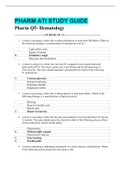
PHARM ATI STUDY GUIDE| VERIFIED SOLUTION
PHARM ATI STUDY GUIDE1. A nurse is assessing a client who is taking amiodarone to treat atrial fibrillation. Which of the following findings is a manifestation of amiodarone toxicity? Light yellow urine Report of tinnitus X Productive cough Blue-gray skin dicoloration 2. A nurse is caring for a client who received IV verapamil to treat supraventricular tachycardia (SVT). The client’s pulse rate is not 98/min and his blood pressure is 74/44 mm Hg. The nurse should anticipate a presc...
- Exam (elaborations)
- • 23 pages •
PHARM ATI STUDY GUIDE1. A nurse is assessing a client who is taking amiodarone to treat atrial fibrillation. Which of the following findings is a manifestation of amiodarone toxicity? Light yellow urine Report of tinnitus X Productive cough Blue-gray skin dicoloration 2. A nurse is caring for a client who received IV verapamil to treat supraventricular tachycardia (SVT). The client’s pulse rate is not 98/min and his blood pressure is 74/44 mm Hg. The nurse should anticipate a presc...
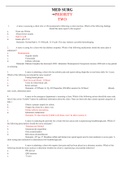
MED SURG →PRIORITY TWO
MED SURG →PRIORITY TWO1. A nurse is assessing a client who is 12hr postoperative following a colon resection. Which of the following findings should the nurse report to the surgeon? a. Heart rate 90/min b. Absent bowel sounds c. Hgb 8.2 g/dl d. Gastric pH of 3.0 Rationale: Normal Hgb is 13-18M g/dl, 12-16 g/dl. This may indicate a possible hemorrhaging. 2. A nurse is caring for a client who has diabetes insipidus. Which of the following medications should the nurse plan to administer? ...
- Exam (elaborations)
- • 20 pages •
MED SURG →PRIORITY TWO1. A nurse is assessing a client who is 12hr postoperative following a colon resection. Which of the following findings should the nurse report to the surgeon? a. Heart rate 90/min b. Absent bowel sounds c. Hgb 8.2 g/dl d. Gastric pH of 3.0 Rationale: Normal Hgb is 13-18M g/dl, 12-16 g/dl. This may indicate a possible hemorrhaging. 2. A nurse is caring for a client who has diabetes insipidus. Which of the following medications should the nurse plan to administer? ...
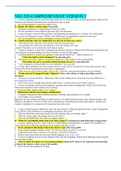
NSG 320 COMPREHENSIVE VERSION 2
NSG 320 COMPREHENSIVE VERSION 21. A nurse is planning care for a preschool-age child who is in the acute phase of Kawasaki disease. Which of the following interventions should the nurse include in the plan of care? a. Give acetaminophen to control the child’s fever B. Monitor the client’s cardiac status (Peds p120) c. Administer antibiotics via intermittent IV bolus for 24 hrs d. Provide stimulation with children of the same age in the playroom 2. A nurse observes a client on the psychi...
- Exam (elaborations)
- • 20 pages •
NSG 320 COMPREHENSIVE VERSION 21. A nurse is planning care for a preschool-age child who is in the acute phase of Kawasaki disease. Which of the following interventions should the nurse include in the plan of care? a. Give acetaminophen to control the child’s fever B. Monitor the client’s cardiac status (Peds p120) c. Administer antibiotics via intermittent IV bolus for 24 hrs d. Provide stimulation with children of the same age in the playroom 2. A nurse observes a client on the psychi...
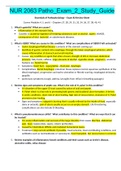
NUR 2063 Patho_Exam_2_Study_Guide
NUR 2063 Patho_Exam_2_Study_GuideEssentials of Pathophysiology – Exam #2 Review Sheet Covers Modules 4, 5, and 6 – Chapters 27, 28, 29, 31, 33, 34, 36, 37, 38, 40, 41 1. What is gastritis? What are causes? • Inflammation of the stomach lining. • Gastritis is caused by ingestion of irritating substances such as alcohol, aspirin, NSAIDS, consequence of viral, bacterial, or autoimmune diseases. • 2. What is GERD? What are causes to this condition? What are complications of GERD i...
- Exam (elaborations)
- • 6 pages •
NUR 2063 Patho_Exam_2_Study_GuideEssentials of Pathophysiology – Exam #2 Review Sheet Covers Modules 4, 5, and 6 – Chapters 27, 28, 29, 31, 33, 34, 36, 37, 38, 40, 41 1. What is gastritis? What are causes? • Inflammation of the stomach lining. • Gastritis is caused by ingestion of irritating substances such as alcohol, aspirin, NSAIDS, consequence of viral, bacterial, or autoimmune diseases. • 2. What is GERD? What are causes to this condition? What are complications of GERD i...
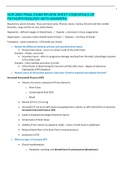
NUR 2063 FINAL EXAM REVIEW SHEET-ESSENTIALS OF PATHOPHYSIOLOGY-WITH-ANSWERS.
NUR 2063 FINAL EXAM REVIEW SHEET-ESSENTIALS OF PATHOPHYSIOLOGY-WITH-ANSWERS.Respiratory system includes: Nose and nasal cavity, Pharynx, larynx, trachea, Bronchi and their smaller branches, Lungs and the air sacs called alveoli, Hypoxemia - deficient oxygen in bloodstream / Hypoxia - a decrease in tissue oxygenation Hypercapnia – excessive carbon dioxide levels in blood / Dyspnea – shortness of breath Tachypnea – rapid respirations, >20 breaths per minute 1. Review the diff...
- Exam (elaborations)
- • 62 pages •
NUR 2063 FINAL EXAM REVIEW SHEET-ESSENTIALS OF PATHOPHYSIOLOGY-WITH-ANSWERS.Respiratory system includes: Nose and nasal cavity, Pharynx, larynx, trachea, Bronchi and their smaller branches, Lungs and the air sacs called alveoli, Hypoxemia - deficient oxygen in bloodstream / Hypoxia - a decrease in tissue oxygenation Hypercapnia – excessive carbon dioxide levels in blood / Dyspnea – shortness of breath Tachypnea – rapid respirations, >20 breaths per minute 1. Review the diff...
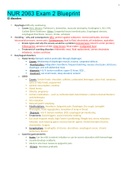
NUR 2063 Exam 2 Blueprint
NUR 2063 Exam 2 Blueprint • Dysphagia Difficulty swallowing o Causes Nero disease: Parkinson’s, dementias, muscular dystrophy, Huntington’s, ALS, MN, Guillain Barre Syndrome. Other: Congenital issues/cerebral palsy, Esophageal stenosis, esophageal diverticula, tumors, stroke, achalasia • Vomiting – why and consequences Why: protect against substance, reverse peristalsis, increase intracranial pressure, severe pain. Consequences: lead to fluid, electrolyte, pH imbalance, aspiration o...
- Exam (elaborations)
- • 14 pages •
NUR 2063 Exam 2 Blueprint • Dysphagia Difficulty swallowing o Causes Nero disease: Parkinson’s, dementias, muscular dystrophy, Huntington’s, ALS, MN, Guillain Barre Syndrome. Other: Congenital issues/cerebral palsy, Esophageal stenosis, esophageal diverticula, tumors, stroke, achalasia • Vomiting – why and consequences Why: protect against substance, reverse peristalsis, increase intracranial pressure, severe pain. Consequences: lead to fluid, electrolyte, pH imbalance, aspiration o...
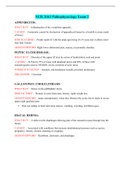
NUR 2063 Pathophysiology Exam 2
NUR 2063 Pathophysiology Exam 2 APPENDICITIS: WHAT IS IT? – Inflammation of the vermiform appendix CAUSES? – Commonly caused by obstruction of appendiceal lumen by a fecalith (a stone made of feces) WHO IS AT RISK? – People under 45 with the peak ages being 10-19 years old; it affects more men than women SIGNS/SYMPTOMS- Right lower abdominal pain, nausea, occasionally diarrhea PEPTIC ULCER DISEASE: WHAT IS IT? – Disorder of the upper GI tract by action of hydrochloric acid and pes...
- Exam (elaborations)
- • 7 pages •
NUR 2063 Pathophysiology Exam 2 APPENDICITIS: WHAT IS IT? – Inflammation of the vermiform appendix CAUSES? – Commonly caused by obstruction of appendiceal lumen by a fecalith (a stone made of feces) WHO IS AT RISK? – People under 45 with the peak ages being 10-19 years old; it affects more men than women SIGNS/SYMPTOMS- Right lower abdominal pain, nausea, occasionally diarrhea PEPTIC ULCER DISEASE: WHAT IS IT? – Disorder of the upper GI tract by action of hydrochloric acid and pes...
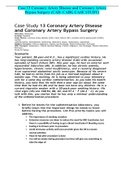
CRITICAL CARE TESTBANK EXAM 2
CRITICAL CARE TESTBANK EXAM 2Chapter 08: Hemodynamic Monitoring 1. The nurse is caring for a 100-kg patient being monitored with a pulmonary artery catheter. The nurse assesses a blood pressure of 90/60 mm Hg, heart rate 110 beats/min, respirations 36/min, oxygen saturation of 89% on 3 L of oxygen via nasal cannula. Bilateral crackles are audible upon auscultation. Which hemodynamic value requires immediate action by the nurse? a. Cardiac index (CI) of 1.2 L/min/m3 b. Cardiac output (CO) of 4...
- Exam (elaborations)
- • 6 pages •
CRITICAL CARE TESTBANK EXAM 2Chapter 08: Hemodynamic Monitoring 1. The nurse is caring for a 100-kg patient being monitored with a pulmonary artery catheter. The nurse assesses a blood pressure of 90/60 mm Hg, heart rate 110 beats/min, respirations 36/min, oxygen saturation of 89% on 3 L of oxygen via nasal cannula. Bilateral crackles are audible upon auscultation. Which hemodynamic value requires immediate action by the nurse? a. Cardiac index (CI) of 1.2 L/min/m3 b. Cardiac output (CO) of 4...
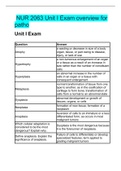
NUR 2063 Unit I Exam overview for patho
NUR 2063 Unit I Exam overview for patho
- Exam (elaborations)
- • 27 pages •
NUR 2063 Unit I Exam overview for patho
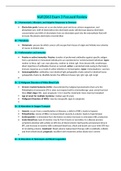
NUR2063 Exam 3 Focused Review
NUR2063 Exam 3 Focused ReviewCh. 2 Homeostasis, Allostasis, and Adaptive Responses to Stressors • Electrolyte pools- bones act as an electrolyte pool and store calcium magnesium, and phosphate ions; shift of electrolytes into electrolyte pools will decrease plasma electrolyte concentration and shift of electrolytes from an electrolyte pool into the extracellular fluid will increase the plasma electrolyte concentration Ch. 7 Neoplasia • Metastasis- process by which cancer cells escape thei...
- Exam (elaborations)
- • 9 pages •
NUR2063 Exam 3 Focused ReviewCh. 2 Homeostasis, Allostasis, and Adaptive Responses to Stressors • Electrolyte pools- bones act as an electrolyte pool and store calcium magnesium, and phosphate ions; shift of electrolytes into electrolyte pools will decrease plasma electrolyte concentration and shift of electrolytes from an electrolyte pool into the extracellular fluid will increase the plasma electrolyte concentration Ch. 7 Neoplasia • Metastasis- process by which cancer cells escape thei...
